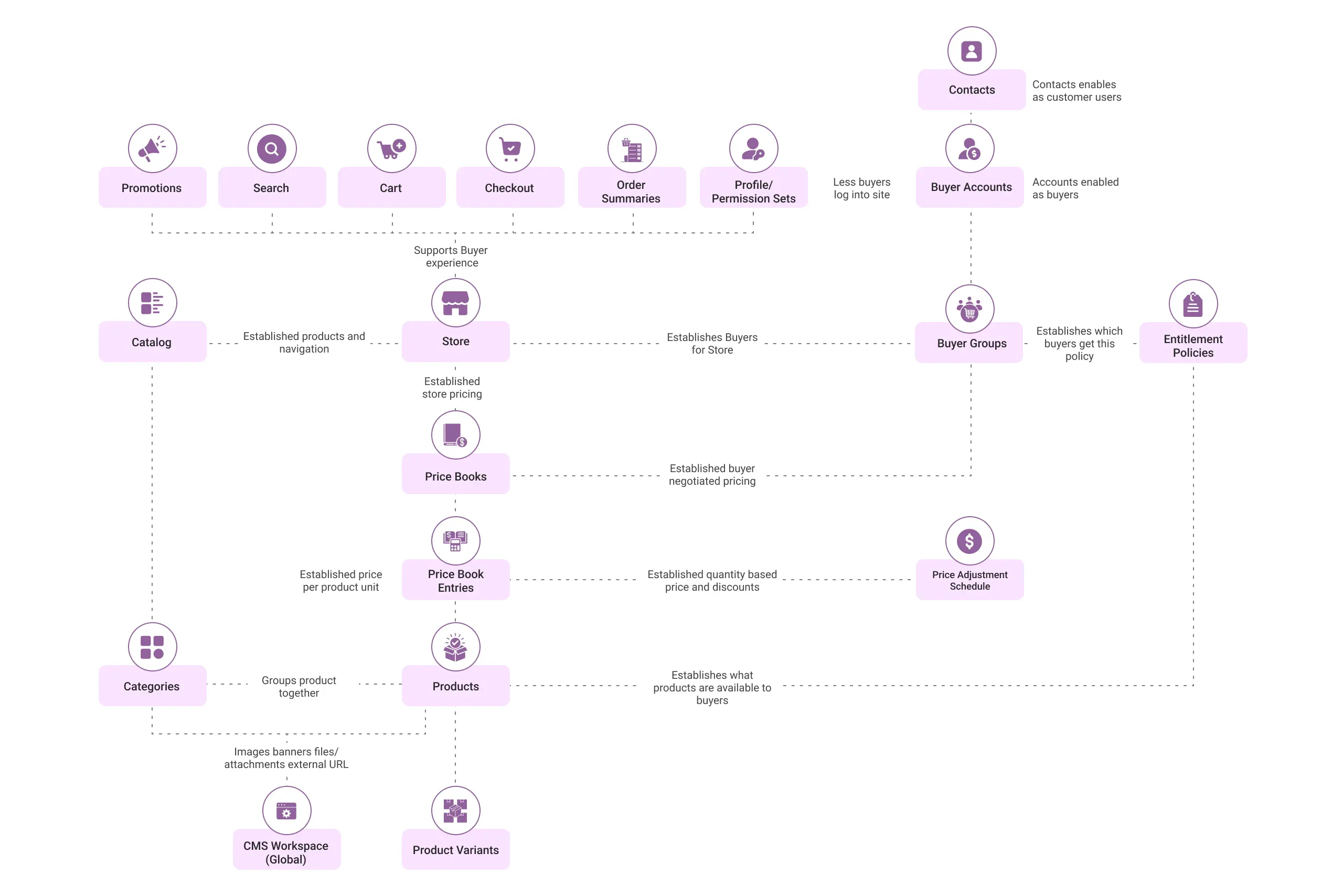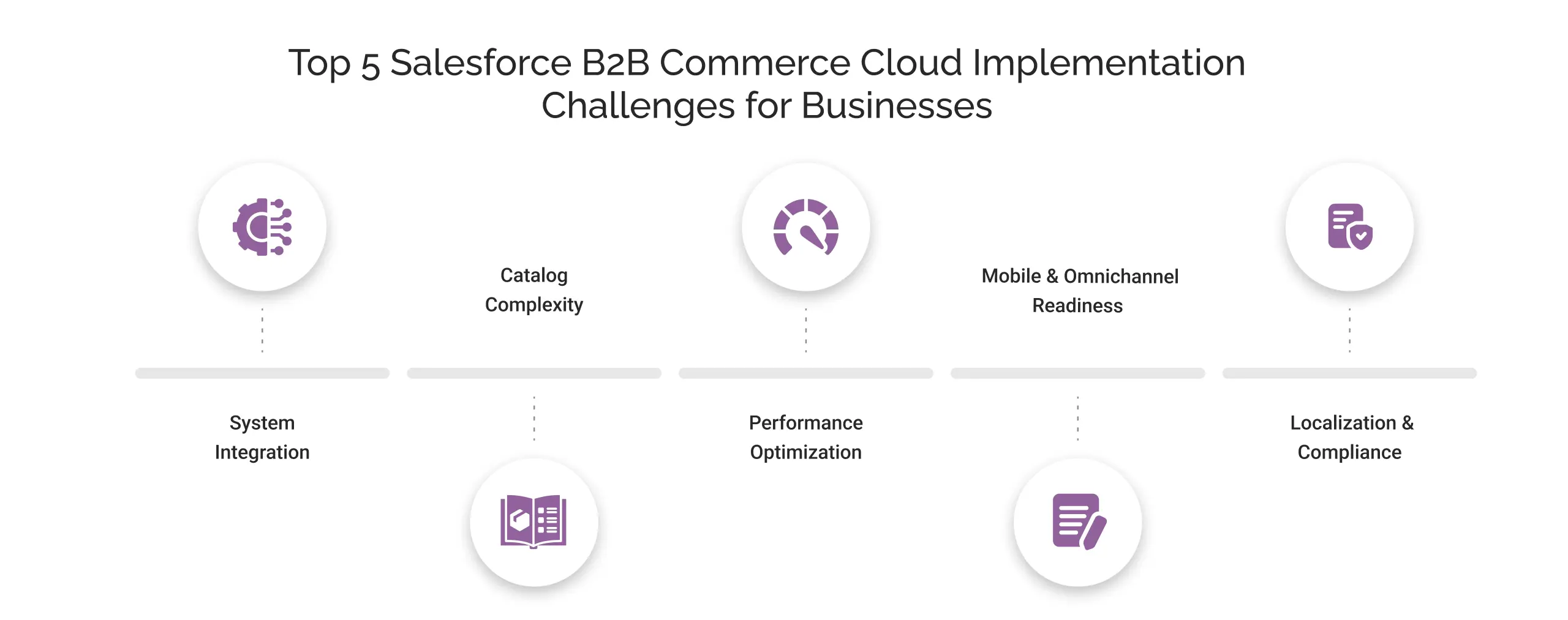Salesforce
ServiceNow
Download Case Study

Download Case Study
Register to read the complete solution and benefits of this Case Study as a PDF on your email.
Table of Contents
Salesforce B2B Commerce Cloud is an e-commerce platform designed specifically for businesses selling to other businesses. Unlike traditional B2C-focused platforms, it handles bulk ordering, contract management, customer-specific catalogs and personalized pricing, helping enterprises digitize and optimize complex B2B processes while ensuring convenience.
In 2018, Salesforce acquired CloudCraze, an established provider of B2B e-commerce solutions, thereby catering to the needs of B2B businesses. It enabled understanding the complex buying behavior of businesses, such as price negotiations, customer-specific catalogs, multi-user accounts, and more. What else is this cloud capable of doing?
This blog answers all your questions related to Salesforce B2B Commerce Cloud.
Let’s get started!

Here are some of the prominent features and functionalities that the platform offers:
The platform streamlines the end-to-end order lifecycle of B2B businesses from order capturing to fulfillment. It automates your entire order processing process, tracks and updates order status in real time for both buyers and sellers, offers accessibility across multiple shipping locations, and has support options.
It starts by capturing the order, aligning and storing it along with the customer name and details. The orders are routed to appropriate fulfillment locations through intelligent order orchestration, and inventory levels are managed accordingly. Once fulfilled, the system receives a shipping notice, and the status is updated for both the customers and service agents.
In case of returns and refunds, the processes related to returns, customer authorization, restocking, inventory update, and issuing the return amount are automated.
This feature of B2B Commerce Cloud allows businesses to easily update and manage product information, ensuring that customers always have access to the latest product details.
It offers product lists along with their pricing that help you manage multiple SKUs (stock-keeping units). It also organizes the products based on the hierarchical category of the product in the storefront, which improves the shopping experience and helps in maintaining accurate inventory levels.
Catalog Builder, one of the features, centralizes all product-related information in one place, allowing businesses to create, manage, and maintain extensive product catalogs with detailed descriptions, specifications, images, and videos. The products are managed in categories and in hierarchical order, taking attributes and variations as the base.
By leveraging Salesforce AI capabilities, the B2B cloud ensures that customers only see products relevant to their interests and preferences.
Salesforce B2B Commerce Cloud supports bulk ordering by enabling self-service enablement, allowing customers to build their carts based on their preferences. They can do it manually by uploading a CSV file that autopopulates the cart or selecting from the live catalogs on the website. For sellers, it updates inventory in real-time as product levels decrease during purchase, making restocking easier.
For quick reordering, Salesforce offers a reorder widget and a reorder portal that displays a buyer’s most recent order and allows them to start a new shopping cart. The system automatically saves past order information, allowing customers to proceed to checkout with just a few clicks.
B2B Commerce enables businesses to launch their digital storefront quickly, sell on any channel, and embed commerce in sales, service, and marketing workflows. It offers you pre-built yet customizable templates, APIs, and features for your business’s digital transformation.
The storefronts can be personalized for different customer segments, offer personalized catalogs, contractual pricing, and content recommendations. This digital storefront allows businesses to reach a wider audience and streamline their sales processes.
The platform automatically adjusts prices in real-time based on market demand, competition, and other external factors. This simplifies complex pricing, including volume discounts and contract pricing. Therefore, enabling sales teams to generate accurate quotes with up-to-date product pricing and availability, which eventually helps improve consistent pricing across all channels.
B2B Commerce supports payment methods like purchase orders (POs), net terms (e.g., net-30, net-60), B2B payment gateways, and automated clearing house (ACH) transactions.
Salesforce B2B Commerce Cloud decouples the front-end digital storefront from back-end business logic. This architecture setup, facilitated through APIs, allows the applications to work independently or even perform certain changes without hampering the functionality of any of the applications. It eventually assists businesses in creating consistent user experiences across.
Customers can shop and pay for B2B products over any channel, including self-service through multi-channel support. This flexibility provided by Salesforce B2B Commerce Cloud allows businesses to meet their customers where they are, providing a hassle-free shopping experience across multiple channels. It enhances customer satisfaction and can lead to increased sales and customer loyalty.
B2B Commerce AI, enhanced by Agentforce AI agents, offers personalized experiences, predictive analytics, automated customer service, dynamic pricing, and streamlined operations.
Advanced AI agents, such as Buyer and Merchant agents, enhance search capabilities, provide sales insights, optimize supply chains, drive efficiency, negotiate contract pricing through customer segmentation, and facilitate smarter decision-making for businesses in the competitive B2B landscape.
This functionality of B2B e-commerce sales involves engaging with customers by offering product demonstrations to capture their interest. These detailed demonstrations help build trust and credibility, which can lead to higher conversion rates. They also allow sales teams to meet specific customer needs and show the value of their products. Meanwhile, effective B2B marketing strategies like SEO, content marketing, email marketing, and social media marketing functionalities are also there to assist businesses in attracting and converting qualified leads, building brand awareness, and engaging with their target audience.
Salesforce B2B Commerce seamlessly integrates with Salesforce CRM, showcasing how Salesforce works to unify customer data, including history, purchase preferences, and cart abandonment behavior. This integration personalizes the buying experience by recommending products tailored to individual behaviors and preferences. As a result, businesses can boost conversion rates and create more effective shopping journeys for their clients.

The Salesforce B2B Commerce Cloud data model shows how different components connect to create a robust B2B buying experience. Let’s understand it:
Though many businesses are utilizing the capabilities of the platform, here are some of the most prominent ones:
General Electric Renewable Energy develops and provides renewable energy solutions, including wind, solar, and hydropower generation, to assist its clients in transforming their energy to cleaner sources.
Their Challenge: Their existing storefront couldn’t engage their customers and failed to give them a complete idea regarding what the company was building and working on next.
Solution: They utilized the capabilities of B2B digital commerce solutions to build a lightweight pilot program to refine the front-end shopping experience without needing to have any back-end implementation.
Result: As a result, the company enhanced its B2B eCommerce experience, increasing customer engagement and having a notable increase of 35% in the user base.
Ovation Medical designs and manufactures and supports. During the COVID-19 pandemic, they had to shift their operations online.
Their challenge: They were facing challenges in creating, managing, and tracking orders online, and they initially did not have any coherence with the Salesforce platform and products.
Solution: They then consulted Salesforce experts, utilized the capabilities of Salesforce B2B Commerce Cloud, and integrated it with Salesforce CRM for uninterrupted fulfillment of the processes.
Result: The company streamlined its operations, enhanced customer engagement, and improved order management efficiency by using the platform.

Salesforce offers two main editions for B2B eCommerce: Commerce Cloud Growth and Commerce Cloud Advanced. Each edition has specific features and pricing based on the Gross Merchandise Value (GMV) of transactions processed through the platform; in other words, this is the total dollar value of merchandise sold through your storefront.

| Model | Commerce Cloud Growth | Commerce Cloud Advanced |
|---|---|---|
| Pricing | 1% of Gross Merchandise Value (GMV) | 2% of Gross Merchandise Value (GMV) |
| Features | – 6 Storefronts – Order Management Lite (Basic order management capabilities) – Basic Analytics and Segmentation – 20 Inventory Locations – 250K Data Cloud Credits – 60K Einstein Requests – 3 CRM Analytics Users – 3 Knowledge Management Users | – 10 Storefronts – Full Order Management (Comprehensive order management capabilities) – Advanced Analytics, Automation, Segmentation, and Personalization – 20 Inventory Locations – 500K Data Cloud Credits – 120K Einstein Requests |

B2B Commerce Cloud offers vast benefits; however, there are a few challenges that persist with its implementation.
System Integration
You might wish to connect the cloud to other business systems such as ERP, payment systems, and more. The systems vary based on data models, API limits, and updates; hence, integrating them requires technical expertise and mapping knowledge.
Catalog Complexity
Planning and stating the catalog size, product variants, and entitlements requires architectural planning.
Performance Optimization
Ensuring fast page load, efficient search, and stable transactions across large product catalogs is essential but complex. It often requires integrating external search tools and using a CDN. CDN refers to Content Delivery Network, which is a geographically distributed network of servers that stores copies of a company’s web content to deliver it quickly and reliably to its business customers.
Mobile & Omnichannel Readiness
Implementing mobile-optimized storefronts with omnichannel capabilities requires technical expertise.
Localization & Compliance
Handling multi-currency, tax, and language localization in the platform requires expert supervision with the relevant knowledge.
To deal with all these challenges, you must hire an expert Salesforce B2B Commerce Cloud developer. They can overcome all these challenges by following the best practices:

Smart IT Staff is an IT staff augmentation firm that provides pre-vetted Salesforce experts holding niche expertise across the Salesforce ecosystem.
We eliminate the need for conducting a full-fledged hiring process and provide you with experts on flexible hiring models.
With over 8 years of experience and 400+ IT professionals in our team, we have completed 900+ projects and built a loyal customer base of 710+ clients across the globe.
You should first define your development needs, the technical skills, and your other requirements. For an elaborate evaluation, you must read how to hire the right Salesforce developer .
While every business is unique in its demands and scope, the costs of hiring a Commerce Cloud developer .can vary significantly based on location and skill level. Therefore, investing in the right skill set ultimately brings ROI faster!
Access a team of certified IT professionals.
Let us know the skills you want to augment your organization, and we’ll help you fill the skill gap rapidly.

By submitting the form, you consent to Smart IT Staff processing your information in accordance with the Privacy Policy. Your information is safe with us, and we will use it for the intended purposes only. You can opt out of email updates at any time.